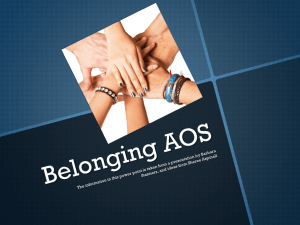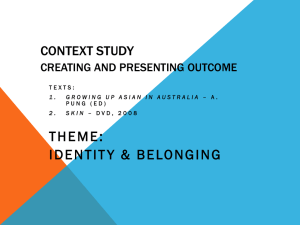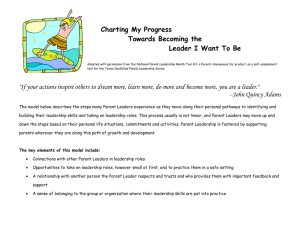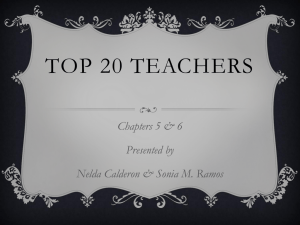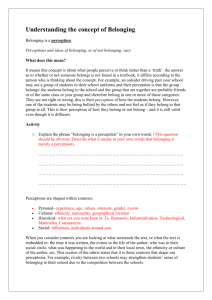An individual`s perceptions of belonging evolve in response to the
advertisement
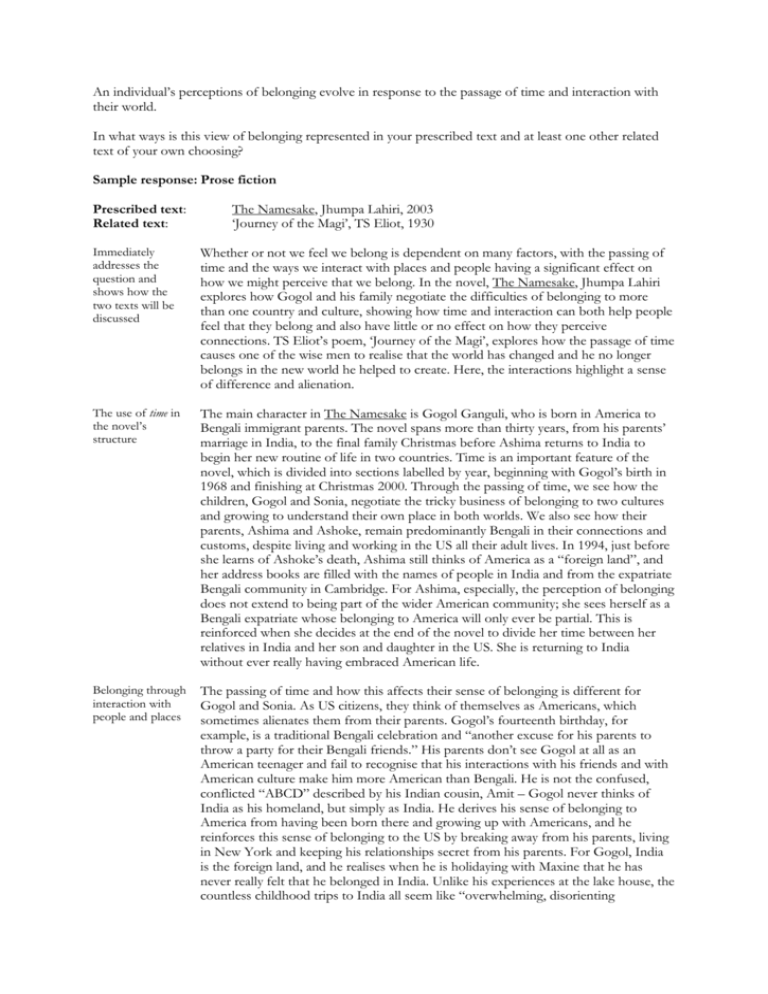
An individual’s perceptions of belonging evolve in response to the passage of time and interaction with their world. In what ways is this view of belonging represented in your prescribed text and at least one other related text of your own choosing? Sample response: Prose fiction Prescribed text: Related text: The Namesake, Jhumpa Lahiri, 2003 ‘Journey of the Magi’, TS Eliot, 1930 Immediately addresses the question and shows how the two texts will be discussed Whether or not we feel we belong is dependent on many factors, with the passing of time and the ways we interact with places and people having a significant effect on how we might perceive that we belong. In the novel, The Namesake, Jhumpa Lahiri explores how Gogol and his family negotiate the difficulties of belonging to more than one country and culture, showing how time and interaction can both help people feel that they belong and also have little or no effect on how they perceive connections. TS Eliot’s poem, ‘Journey of the Magi’, explores how the passage of time causes one of the wise men to realise that the world has changed and he no longer belongs in the new world he helped to create. Here, the interactions highlight a sense of difference and alienation. The use of time in the novel’s structure The main character in The Namesake is Gogol Ganguli, who is born in America to Bengali immigrant parents. The novel spans more than thirty years, from his parents’ marriage in India, to the final family Christmas before Ashima returns to India to begin her new routine of life in two countries. Time is an important feature of the novel, which is divided into sections labelled by year, beginning with Gogol’s birth in 1968 and finishing at Christmas 2000. Through the passing of time, we see how the children, Gogol and Sonia, negotiate the tricky business of belonging to two cultures and growing to understand their own place in both worlds. We also see how their parents, Ashima and Ashoke, remain predominantly Bengali in their connections and customs, despite living and working in the US all their adult lives. In 1994, just before she learns of Ashoke’s death, Ashima still thinks of America as a “foreign land”, and her address books are filled with the names of people in India and from the expatriate Bengali community in Cambridge. For Ashima, especially, the perception of belonging does not extend to being part of the wider American community; she sees herself as a Bengali expatriate whose belonging to America will only ever be partial. This is reinforced when she decides at the end of the novel to divide her time between her relatives in India and her son and daughter in the US. She is returning to India without ever really having embraced American life. Belonging through interaction with people and places The passing of time and how this affects their sense of belonging is different for Gogol and Sonia. As US citizens, they think of themselves as Americans, which sometimes alienates them from their parents. Gogol’s fourteenth birthday, for example, is a traditional Bengali celebration and “another excuse for his parents to throw a party for their Bengali friends.” His parents don’t see Gogol at all as an American teenager and fail to recognise that his interactions with his friends and with American culture make him more American than Bengali. He is not the confused, conflicted “ABCD” described by his Indian cousin, Amit – Gogol never thinks of India as his homeland, but simply as India. He derives his sense of belonging to America from having been born there and growing up with Americans, and he reinforces this sense of belonging to the US by breaking away from his parents, living in New York and keeping his relationships secret from his parents. For Gogol, India is the foreign land, and he realises when he is holidaying with Maxine that he has never really felt that he belonged in India. Unlike his experiences at the lake house, the countless childhood trips to India all seem like “overwhelming, disorienting expeditions” where he could never really relax or feel at home. Time helps us understand aspects of belonging However, by the end of the novel, the passing of time helps Gogol to understand more about Bengali culture. This is especially so with the traditional mourning rituals; what seemed pointless or irritating when he was younger and enacting traditional mourning for distant relatives, takes on a special significance and meaning when, as a young man, he mourns his father’s death and understands how certain elements bring him, his mother and his sister closer together, to draw comfort from each other and share each others’ grief. He also understands by the final Christmas how his parents have tried to merge the old and the new, not only so the family could feel that they belonged in the American community, but also so that new Bengali expatriates could feel a sense of belonging in their new land. The related text is discussed In contrast, ‘Journey of the Magi’ begins with a sense of discomfort and unease which has grown to unsettling alienation by the end of the poem. The narrator is one of the wise men, who recounts the difficulties of the journey to witness the birth of Christ. He “would do it again”, but nevertheless is full of doubt about the meaning of what they saw, feeling that, at the end of his life, he has had a role in the death of his own culture and way of life. Eliot establishes the sense of not belonging in the first line, with “cold”, and reinforces the difficulty and tedium of the journey throughout the first stanza. It is the “worst time of the year”, the journey “long” and in “the very dead of winter”. They regret trading their comfortable lives for a lack of shelter, hostile receptions in “unfriendly” towns and the nagging sense that “this was all folly.” Here, their interaction with the world is painful and arduous, creating a sense that the magi are on a doomed mission and do not belong in the hostile landscape. How language conveys meaning A sense of not belonging is created through hostile interaction The tone shift from negative – not belonging – to positive – belonging – is discussed The tone shift at the beginning of the second stanza makes us feel that the journey was worthwhile, after all. Words like “temperate”, “vegetation” and “running stream” are positive and soothing, creating a sense that the magi have left behind their difficulties and have been welcomed into the new landscape. Eliot uses biblical symbolism here – “three trees on the low sky”, “dicing for pieces of silver” – to tell us that the magi have reached their destination. They find the place “satisfactory”, suggesting that at the time, having succeeded in finding the new “king”, they do not regret the journey. A discussion of how the poem shows that perceptions about belonging change over time The third stanza begins with, “All this was a long time ago”, so we know that much time has passed and the old magus is now reflecting on the importance of their journey. His perceptions about belonging have changed considerably over this length of time. While he does not regret the journey – “I would do it again” – over the years he has developed strong doubts about the meaning of what they found. He feels that they found both birth and death. The birth is literally Christ’s birth, and figuratively the birth of a new religion and world order. This means the death of the old religions and the old ways of life of the magus and others like him. He recognises the irony of the situation, that by heralding the birth so long ago, he has been responsible for the death of his own traditional cultural beliefs and practices. He does not belong in the new world, being “no longer at ease here”, and he is part of an “alien people”. The worrying omens from the start of the journey have been fulfilled. Having seen the death of the old way of life and no longer belonging, he wishes for his physical death. Conclusion briefly states how both texts fit the question Both texts deal with how people’s feelings about belonging and not belonging change over time and through interacting with the world around them. There is a generational difference about these feelings in The Namesake, where over time the parents feel some belonging in America, while remaining strongly Bengali, while their children feel predominantly American and develop some affinity with India over time. In ‘Journey of the Magi”, we see how time and events show the magus that he does not belong in the new world that he has helped to reveal.
